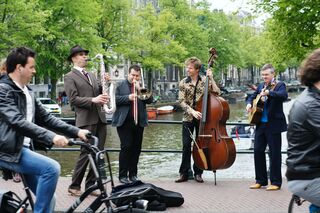Left Brain - Right Brain
On the Art and Science of Psychotherapy
An interview with Dr. Michael Alcee.
Posted March 8, 2022 Reviewed by Ekua Hagan
Key points
- Psychotherapy is grounded in science yet also requires the emotional sensitivity of an artist.
- Interpersonal relationships can resemble a complex jazz improvisation with each participant adding unique musical dynamics.
- Psychotherapy requires the use of both hemispheres of the brain: the left hemisphere's interest in theory, and the right hemisphere's intuition.

Psychotherapy serves as both an art and a science. Grounded in psychological theory and scientific research, psychologists study techniques to help struggling people cope. Yet the practice of responding to patients in the therapy office requires the emotional sensitivity of an artist. The best therapists rely on a balance of theory and art, responding flexibly to each unique patient.
Clinical psychologist Dr. Michael Alcee is such a therapist. I was honored to interview him about his new book, Therapeutic Improvisation: How to Stop Winging it and Own It as a Therapist. It is rare to read a book for psychotherapists that sings with abundant musical metaphors and artistic similes. It could double as a book on creativity for artists, musicians, and creative writers. I hope you enjoy our conversation.
GSS: Thank you, Dr. Alcee, for sharing your incredible book with me and agreeing to this interview. In Therapeutic Improvisation, you compare psychotherapy to jazz improvisation. Can you say a bit more about that?
MA: Our emotions and thoughts are shifting all the time like an up-tempo jazz tune one moment and then a rich, slow ballad at another. That is life itself. Much like jazz improvisers, we need to learn how to read these changes and make new melodic lines on the chords that either pass us by so quickly or challenge us with complex harmonies. This is the way we can feel most fulfilled, content, creative, and alive, yet we often don't have much training in this art of psychological improvisation.
We need it desperately now more than ever because changes come at all of us so quickly, and our capacity to listen to ourselves and each other gets drowned out by so much noise, our buzzing cell phones pinging us at every moment of the day, televisions and computer screens taking us away from our own sacred interior, and the lack of a shared 'musical genre' we can all play together.
Therapy becomes that training to help us listen more closely to ourselves and each other and to help us embrace the paradox of spontaneity and preparation. Just as jazz improvisers bring their all in the present moment, they only can do so because they have prepared and practiced by reflecting on what has worked in the past and what could be interesting in the future. Wouldn't it be wonderful if we could approach our emotional and intellectual lives in this way, balancing the best of these two worlds?
Jazz musicians also embrace rather than avoid the dissonances, leaning into them to traverse new territory and make new forms. We could all suffer less if we had training with learning how to compassionately and mindfully do this in our emotional lives as well.
Therapists help us put this into practice, so life becomes the art of reading the changes of ourselves (and each other) such that life becomes a perpetually evolving song.
GSS: I love that idea of musical dissonance, or disharmony, as something both therapists and jazz improvisers embrace. We, therapists, seek to understand the disharmony our clients' experience and the dissonance within ourselves. You describe how the human brain is uniquely wired for preparation and spontaneity. How does that work?
MA: Albert Einstein once said: "The intuitive mind is a sacred gift, and the rational mind is a faithful servant. We have created a society that honors the servant and has forgotten the gift."
It's always been a bit funny to me that we humans forget from whence we have come. The truth is that our right brain—the home of our deepest empathy, imagination, intuition, metaphor, humor, and all that is most magical about us as creatures—comes online from the start as children and forms the foundation of our psyches. It is only much later, at around 7 years old, that our left brain really starts to blossom with its analytical prowess, language capacity, and forward-thinking deliberation.
While the left brain also makes us wondrous, to paraphrase Iain McGilchrist, it is the emissary and not the master. To me, it is such a shame that our culture and even well-meaning teachers, parents, and therapists forget this powerful truth. I have always treasured the arts, from literature, music, acting, and everything in between, because it never forgets our first home.
The maestro is in the right hemisphere, in the tone of our words, in the nonverbal cues in the facial gaze, in the mysterious interconnections of our most abiding relationships, and the novelty that we seek from our earliest days.
Don't get me wrong, there is beauty in how we have been constructed: We are complementary, catalytic, and creative. And yet, at the same time, we are also contradictory, antagonistic, and self-negating. Our left and right brains are often at odds with each other—and thus, we are at odds with ourselves but again. When we learn how to read these dissonances better, we can make something artful out of them, something that partakes of and transcends either side alone. And so, we can become greater than the sum of our parts when we do this, and we often find that we do it best in relationships.
Therapy is meant only to be a reawakening of how relationships can do this, bringing us back to ourselves and each other by reminding us of what we are capable of already.
GSS: I find it fascinating that our very nature is a dissonant dialogue of two conflicting views of the world at times. Both the left and right brain, like art and science, help us solve problems, connect with others, and create wondrous things. Thank you for sharing your insights on the art and science of psychotherapy, Dr. Alcee. It has been a pleasure!
To find a therapist, please visit the Psychology Today Therapy Directory.
References
Alcee, M. (2022) Therapeutic Improvisation: How to stop winging it and own it as a therapist. New York: W W Norton & Co.




